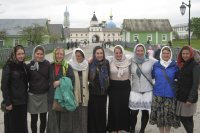Writers from Equatorial Guinea to speak
Four writers from Equatorial Guinea, the only Spanish-speaking nation in Africa, visit Bates College to give a joint presentation titled “Writing Africa in Spanish: Four Equatorial Guinean Writers Speak of Exiled Dreams” at 4:15 p.m. Tuesday, March 31, in the Edmund S. Muskie Archives, 70 Campus Ave.
Writers Justo Bolekia Boleká, Donato Ndongo Bidyogo, Remei Sipi Mayo and Francisco Zamora Loboch will give their talks in Spanish, with translation provided. Sponsored by the Department of Romance Languages and Literatures, the event is open to the public at no cost. For more information, please call 207-786-8293.
The West African nation of Equatorial Guinea marked the 40th anniversary of its independence from Spain last October. The writers’ visit to Bates is one in a series of cultural activities at different U.S. universities preceding an international conference at Hofstra University titled “Between Three Continents: Rethinking Equatorial Guinea on the 40th Anniversary of its Independence from Spain.”
In the early part of the 20th century the territory known as “Spanish Guinea” became notorious as a place where slave labor was practiced. In mid-century, Equatorial Guinea was the world´s leading cocoa producer.
When the movement towards African independence forced Spain’s Franco regime to grant its colony political freedom, the process became a bizarre series of political contradictions: A European dictatorship was trying to conduct a democratic process in a country that until 1959 had systematically denied citizenship rights to its black inhabitants.
After independence, in 1968, relations between Spain and its former colony deteriorated rapidly. A third of the population was either killed or fled into exile under the dictatorship of the first president, Francisco Macías, who banned churches, schools and even the word “intellectual.” After Macías’ ouster and execution in 1979, another member of his clan, Teodoro Obiang, proclaimed himself president and has remained in power ever since.
Independence gave exiled Equatorial Guinean intellectuals the opportunity to speak up not only about the deterioration of civil society in the country, but also about the Spanish colonial era.
Writers like Ndongo, Zamora, Bolekia and others brought events in Equatorial Guinea to the attention of an increasingly large international public. At the same time, they cast a critical look at Spain’s colonial past, and by extension all European colonial adventures in Africa.
In the years since the end of the Macías regime, younger intellectuals and artists have built on these foundations, exploring Equatorial Guinea’s role in relation to both Europe and other African countries, Latin America, and the United States. Equatorial Guinea is now Africa’s third largest oil producer, which has opened up new opportunities and challenges as well as close ties and visibility within the United States.
Boleká is a professor of French at the Universidad de Salamanca, in Spain. He is a linguist, essayist and compiler of traditional narratives of the Bubi people, as well as the author of the first comprehensive grammar of Bubi, his first language. He has published three books of poetry, as well as the study Lengua y poder en África (“Language and Power in Africa,” Mundo Negro, 2001). He is an active opponent of the current undemocratic regime in his country.
Ndongo is a journalist, essayist, historian and novelist. He denounced the Macías dictatorship in his early work Historia y tragedia de Guinea Ecuatorial (“History and Tragedy of Equatorial Guinea,” Cambio, 1977). He also published the first anthology of Equatorial Guinean literature in 1984 and wrote what is considered the foundational novel of Equatorial Guinea after independence, Las tinieblas de tu memoria negra (“Shadows of Your Black Memory,” Editorial Fundamentos, 1987; an English translation appeared in 2008).
Sipi, a writer and essayist, works with issues related to gender and African women, with particular emphasis on immigrant women in Spain and Europe. Her latest book, Inmigración y género: El caso de Guinea Ecuatorial (“Immigration and Gender: The Case of Equatorial Guinea,” Gakoa, 2004), advocates for the rights of Equatorial Guinean women who migrate to support their families. She lives in Barcelona.
Zamora studied journalism and has written many articles in the Spanish press. He is the author of Cómo ser negro y no morir en Aravaca (“How to be black and not die in Aravaca,” Ediciones B, 1994) and two books of poetry, Memoria de laberintos (“Memoir of Labyrinths,” SIAL Ediciones, 1999) and Desde el Viyil (“From Mount Viyil,” SIAL Ediciones, 2008), among other works.



